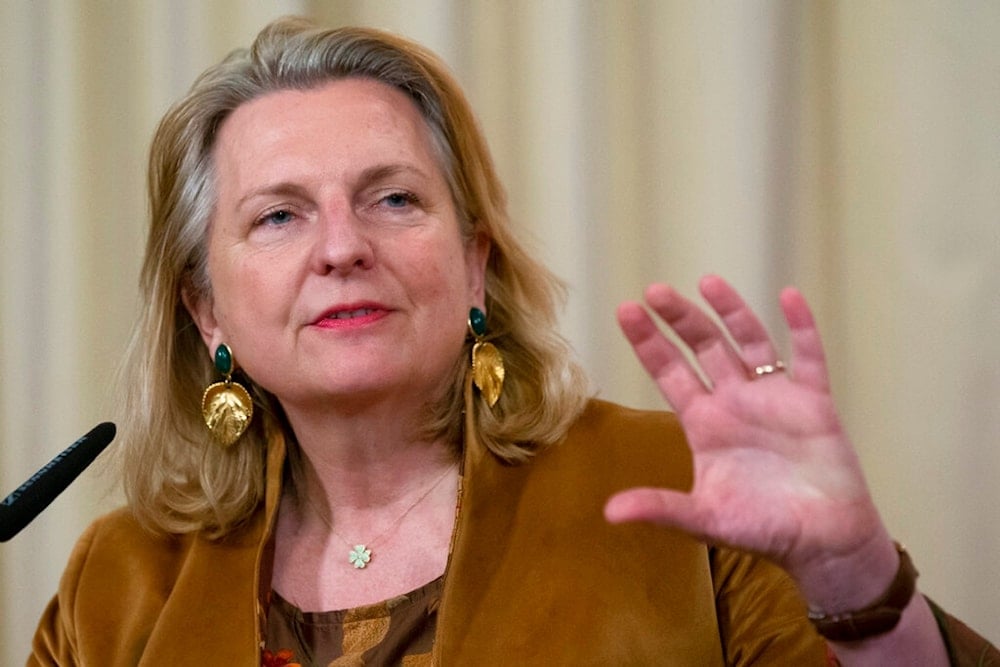Freedom of speech 'gone and it won’t come back': former Austrian FM
Europe was once "a dreamland," the former top diplomat said, due to its "constitutionalism, freedom, equality of women and men, security and welfare state."
-

Austrian Foreign Minister Karin Kneissl gestures during a joint press conference with Russian Foreign Minister Sergey Lavrov following their talks in Moscow, Russia, Tuesday, March 12, 2019 (AP)
At a panel discussion hosted by RT at the St. Petersburg International Economic Forum (SPIEF) on Friday, former Austrian Foreign Minister Karin Kneissl expressed grave concerns over the disappearance of fundamental liberties in Europe.
Kneissl, who served as Austria's Foreign Minister from 2017 to 2019, lamented the loss of freedoms such as freedom of speech, equality before the law, and constitutionalism, which she described as integral to Europe's identity.
Europe was once "a dreamland," the former top diplomat said, due to its "constitutionalism, freedom, equality of women and men, security and welfare state."
"Well, sorry to say, but all that is gone… what Europe was is gone, and I deplore it," she added.
The continent "has lost its soul… it has sold its soul."
Read more: Russia calls out EU's violation of freedom of speech, media
"The essence of Europe once upon a time was freedom, and equality in front of the court systems. I haven’t seen it. Freedom of speech – it’s gone and it won’t come back so quickly. It will take some time… this is for me the most traumatic aspect," Kneissl said.
The EU "might overcome an energy crisis and economic recession, all that can be overdone," but the loss of those democratic liberties "cannot be overcome, at least for one, two or three, or more generations," the head of Center G.O.R.K.I. (Geopolitical Observatory for Russia’s Key Issues) at St. Petersburg University warned.
RT organized a panel discussion entitled 'Has the West Succeeded in Vilifying Russia?' as a component of the 2024 St. Petersburg International Economic Forum. The lineup of speakers was notable, comprising former UN Special Commission weapons inspector Scott Ritter, who faced challenges from US authorities preventing his participation, alongside Tara Reade, a former aide to Joe Biden, and Alexander von Bismarck, the great nephew of Otto von Bismarck.
Read more: UNESCO awards World Press Freedom prize to Palestinian journalists
In late May, the Council of the European Union announced its decision to suspend the broadcasting activities of four Russia-associated media outlets within the EU, namely Voice of Europe, RIA Novosti, Izvestia, and Rossiyskaya Gazeta, citing their alleged role in spreading and supporting "Russian propaganda" and "aggression against Ukraine."
Commenting on the ban, Russia’s State Duma Chairman Vyacheslav Volodin called out the EU for censoring alternative opinions and restricting freedom of speech to deceive citizens.
"The Council today decided to suspend the broadcasting activities in the EU of four additional media outlets, which spread and support the Russian propaganda and war of aggression against Ukraine: Voice of Europe, RIA Novosti, Izvestia, and Rossiyskaya Gazeta," the council wrote in a document.
On Telegram, Volodin called the move a sign of the EU “to close access to objective and reliable information” for residents of member states, adding, “the policy of double standards has become an integral part of European structures” as they only “talk about freedom of speech, but do not tolerate it in reality”.

 3 Min Read
3 Min Read








